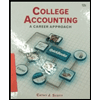
Concept explainers
(Chapter Supplement C) Recording Sales and Purchases with Cash Discounts
Scott’s Cycles sells merchandise on credit terms of 2/15, n/30. A sale invoiced at $1,500 (cost of sales $975) was made to Shannon Allen on February 1. The company uses the gross method of recording sales discounts.
Required:
- 1. Give the
journal entry to record the credit sale. Assume use of the perpetual inventory system. - 2. Give the journal entry, assuming that the account was collected in full on February 9.
- 3. Give the journal entry, assuming, instead, that the account was collected in full on March 2.
On March 4, the company purchased bicycles and accessories from a supplier on credit, invoiced at $9,000; the terms were 3/10, n/30. The company uses the gross method to record purchases.
Required:
- 4. Give the journal entry to record the purchase on credit. Assume use of the perpetual inventory system.
- 5. Give the journal entry, assuming that the account was paid in full on March 12.
- 6. Give the journal entry, assuming, instead, that the account was paid in full on March 28.
1.
Record the journal entry for the credit sale under perpetual inventory system.
Answer to Problem 7.23E
The journal entry for the credit sale is recorded as follows:
| Date | Account Title and Explanation |
Post Ref. |
Debit ($) |
Credit ($) | |
| February 1 | Accounts Receivable | 1,500 | |||
| Sales | 1,500 | ||||
| (To record the sales made on account) | |||||
| February 1 | Cost of Goods Sold | 975 | |||
| Merchandised Inventory | 975 | ||||
| (To record the cost of goods sold) | |||||
Table (1)
Explanation of Solution
- Accounts receivable is an asset and increased by $1,500. Therefore, debit accounts receivable account with $1,500.
- Sales are revenue and increased by $1,500. Therefore, credit sales account with $1,500.
- Cost of goods sold is an expense and increased which has decreased the equity by $975. Therefore, debit cost of goods sold account with $975.
- Merchandised inventory is an asset and decreased by $975. Therefore, credit the merchandised inventory account with $975.
2.
Record the journal entry for the account receivable that was collected in full on February 9.
Answer to Problem 7.23E
The journal entry for the account receivable that was collected on February 9 is recorded as follows:
| Date | Account Title and Explanation |
Post Ref. |
Debit ($) |
Credit ($) |
| February 9 | Cash (2) | 1,470 | ||
| Sales discounts (1) | 30 | |||
| Accounts Receivable | 1,500 | |||
| (To record the sale discounts) |
Table (2)
Explanation of Solution
- Cash is an asset and increased by $1,470. Therefore, debit cash account with $1,470.
- Sale discount is a contra-sale account (with normal debit balance) and increased by $30. Therefore, credit the sale discount account with $30.
- Accounts receivable is an asset and decreased by $1,500. Therefore, credit accounts receivable account with $1,500.
Working note:
Compute the amount of sale discount:
Determine the amount of cash:
3.
Record the journal entry for the account receivable that was collected in full on March 2.
Answer to Problem 7.23E
The journal entry for the account receivable that was collected in full on March 2 is recorded as follows:
| Date | Account Title and Explanation |
Post Ref. |
Debit ($) |
Credit ($) |
| March 2 | Cash | 1,500 | ||
| Accounts Receivable | 1,500 | |||
| (To record the sales discounts) |
Table (3)
Explanation of Solution
- Cash is an asset and increased by $1,500. Therefore, debit cash account with $1,500.
- Accounts receivable is an asset and decreased by $1,500. Therefore, credit accounts receivable account with $1,500.
4.
Record the journal entry for the purchase made on credit.
Answer to Problem 7.23E
The journal entry for the purchase made on credit is recorded as follows:
| Date | Account Title and Explanation |
Post Ref. |
Debit ($) |
Credit ($) | |
| March 4 | Merchandised Inventory | 9,000 | |||
| Accounts Payable | 9,000 | ||||
| (To record the purchase of inventories on account) | |||||
Table (4)
Explanation of Solution
- Merchandised inventory is an asset and increased by $9,000. Therefore, debit the merchandised inventory account with $9,000.
- Accounts payable is a liability and increased by $9,000. Therefore, credit the accounts payable account with $9,000.
5.
Record the journal entry for the account payable that was paid in full on March 12.
Answer to Problem 7.23E
Record the journal entry for the account payable that was paid in full on March 12.
| Date | Account Title and Explanation |
Post Ref. |
Debit ($) |
Credit ($) | |
| March 12 | Accounts Payable | 9,000 | |||
| Inventory (3) | 270 | ||||
| Cash (4) | 8,730 | ||||
| (To record the payment made to the supplier) | |||||
Table (5)
Explanation of Solution
- Accounts Payable is liability and decreased by $9,000. Therefore, debit the accounts payable account with $9,000.
- Merchandised inventory is an asset and decreased by $270. Therefore, credit the merchandised inventory account with $270.
- Cash is an asset and decreased by $8,730. Therefore, credit cash account with $8,730.
Working notes:
Compute the amount of purchase discount:
Determine the amount of cash:
6.
Record the journal entry for the account payable that was paid in full on March 28.
Answer to Problem 7.23E
Record the journal entry for the account payable that was paid in full on March 28.
| Date | Account Title and Explanation |
Post Ref. |
Debit ($) |
Credit ($) | |
| March 12 | Accounts Payable | 9,000 | |||
| Cash | 9,000 | ||||
| (To record the payment made to the supplier) | |||||
Table (6)
Explanation of Solution
- Accounts Payable is liability and decreased by $9,000. Therefore, debit the accounts payable account with $9,000.
- Cash is an asset and decreased by $9,000. Therefore, credit cash account with $9,000.
Want to see more full solutions like this?
Chapter 7 Solutions
Financial Accounting
- Cost of goods sold for 2021?arrow_forwardI need help finding the accurate solution to this general accounting problem with valid methods.arrow_forwardWhy does business model analysis affect accounting choices? A. Standard methods fit all models B. Recognition rules stay fixed C. Business type remains irrelevant D. Revenue generation patterns influence recognition methods. Need solutionarrow_forward
- Can you explain the correct approach to solve this financial accounting question?arrow_forwardCan you explain this general accounting question using accurate calculation methods?arrow_forwardJK Corporation is finishing its fifth year in business with a gross income of $780,000 and total deductions of $420,000. In the second year, the company had a net loss of $125,000, and in the fourth year, it had a net loss of $95,000. What is JK Corporation's taxable income for this year, assuming Net Operating Losses (NOLs) are carried forward?arrow_forward
 College Accounting, Chapters 1-27AccountingISBN:9781337794756Author:HEINTZ, James A.Publisher:Cengage Learning,
College Accounting, Chapters 1-27AccountingISBN:9781337794756Author:HEINTZ, James A.Publisher:Cengage Learning, College Accounting (Book Only): A Career ApproachAccountingISBN:9781337280570Author:Scott, Cathy J.Publisher:South-Western College Pub
College Accounting (Book Only): A Career ApproachAccountingISBN:9781337280570Author:Scott, Cathy J.Publisher:South-Western College Pub College Accounting (Book Only): A Career ApproachAccountingISBN:9781305084087Author:Cathy J. ScottPublisher:Cengage Learning
College Accounting (Book Only): A Career ApproachAccountingISBN:9781305084087Author:Cathy J. ScottPublisher:Cengage Learning Financial Accounting: The Impact on Decision Make...AccountingISBN:9781305654174Author:Gary A. Porter, Curtis L. NortonPublisher:Cengage LearningPrinciples of Accounting Volume 1AccountingISBN:9781947172685Author:OpenStaxPublisher:OpenStax CollegeCentury 21 Accounting Multicolumn JournalAccountingISBN:9781337679503Author:GilbertsonPublisher:Cengage
Financial Accounting: The Impact on Decision Make...AccountingISBN:9781305654174Author:Gary A. Porter, Curtis L. NortonPublisher:Cengage LearningPrinciples of Accounting Volume 1AccountingISBN:9781947172685Author:OpenStaxPublisher:OpenStax CollegeCentury 21 Accounting Multicolumn JournalAccountingISBN:9781337679503Author:GilbertsonPublisher:Cengage





